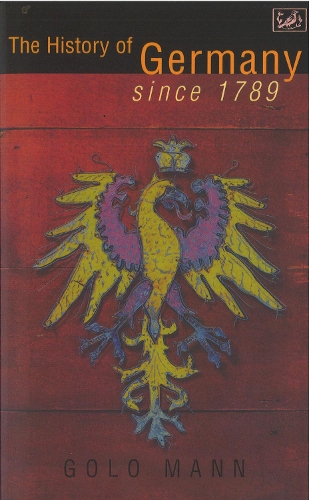
The History of Germany Since 1789
(Paperback)
Publishing Details
The History of Germany Since 1789
By (Author) Golo Mann
Vintage
Pimlico
22nd November 1996
United Kingdom
Classifications
General
Non Fiction
Cultural studies
943.06
Physical Properties
Paperback
560
Width 135mm, Height 216mm, Spine 39mm
585g
Description
The finest one-volume history of Germany ever published. 'At times,' writes Golo Mann, 'the Germans seem a philosophical people, at others the most practical and most materialistic at times the most peaceful, at others the most domineering and brutal. Time after time they have surprised the world by things least expected of them.' It is this quality of paradox, even of mystery, in the German nation that the distinguished historian renders with such subtlety and penetration in this celebrated study. It traces the whole sweep of intellectual development in Germany since the French Revolution. As well as chronicling historic events, the book deals in detail with the contributions of philosophers, poets and novelists alongside those of parliamentarians and generals.
Reviews
He is a luminous and incisive commentator who weaves together social, political and intellectual themes with quite exceptional skill and authority -- John Gross * Observer *
Not only a brilliant work of scholarship but also eminently readable -- H. W. Koch * New Society *
A book we simply cannot do without -- Geoffrey Barraclough * Spectator *
Author Bio
Born in 1909, Golo Mann was the son of novelist Thomas Mann. He read history, modern languages and philosophy at Heidelberg University. From 1933 to 1937 he taught at various French universities; from 1943 to 1946 he served in the US army and then taught for ten years in California. He was later Professor of History at the Universities of Munster and Stuttgart. Professor Mann's previous books include Secretary of Europe (1946), a study of Friedrich von Gentz. His monumental biography of Wallenstein was published in Germany in 1971. In 1962 he was awarded the Fontane Prize by the city of Berlin, and in 1964 the Schillerpreis by the city of Mannheim as well as the Buchner Prize (1968), the Gottfried Keller Preis (1969), the Schiller-Gedachtnispreis (1977) and the Order Pour la Merite. He was a member of the American Academy of Arts and Sciences. He died in 1994.
